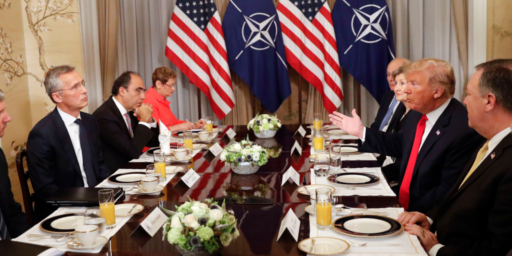Let Europe be Europe
Victor Davis Hanson is exceedingly pessimistic about the future of the US-European alliance, arguing that the problem is not the abrasiveness of the Bush administration but a moral malaise on the Continent.
It was moving to commemorate the Normandy invasion on its 60th anniversary, but politely left unsaid amid the French-hosted celebrations was the real story of 1944 and 1945. We owe it to the dead, not just the living, to remember it with some integrity and honesty. Most of the Nazis’ own European subjects did little to stop their mass murdering. There was no popular civilian uprising inside Germany or out. Most Germans were hostile to the onslaught of American armies in their country, preferring Hitler and the Nazis even by 1945 to so-called American liberators. When they did slur the Fuhrer it was because he brought them ruin, not the blood of millions on their hands. When they did stop fighting the Americans, it was because the thought of surrendering to the Russians was far worse.
Most Frenchmen either refused to resolutely fight the Germans or passively collaborated. The idea of a broad resistance was mostly a postwar Gallic nationalist myth. Those who spearheaded a few attacks on German occupiers were more likely led by Communists than by allied sympathizers, and thus fought in hope more of an eventual Soviet victory over the Nazis than an American one.
Meanwhile, those born after World War II in these two countries either know nothing about the American sacrifice or chalk the invasion up to the insanity of war in general. I won’t even speak of a sense of gratitude, because that is an emotion almost as archaic to the contemporary European mind as patriotism. Nearly 30 percent of all Frenchmen polled last year wished Saddam to defeat the United States in Iraq.
***
We seek not to punish Europe by our departure, but to save it from itself. The problem is not just that our troops are doing nothing in places like Germany, or merely that they are more needed elsewhere — they do real damage by their presence in enabling an increasingly strident and opportunistic pacifism and an anti-Americanism fueled by dependency and ignited by resentment.
The continent is now the repository of Western heritage — a beautiful museum or amusement park, if you will, of caretakers and custodians. Unless that changes, we should no more expect Europeans to participate in the slogging in Iraq or Afghanistan than we should count on Disneyland guides venturing into nearby South Central to adjudicate gang violence, or Smithsonian docents to keep the piece in D.C. neighborhoods. Barring a 9/11-like event at the Parthenon or Louvre, one cannot — and should not — ask people to do what they simply cannot and will not do.
***
I fear that we should expect over the next 50 years some pretty scary things coming out of Europe as its impossible postmodern utopian dreams turn undemocratic and then ugly — once its statism and entitlement economy falter; Jews leave as Arabs stream in; its shaky German-French axis unravels; its next vision of an EU mare nostrum encompassing North Africa and Turkey begins to terrify Old Europe; and its pacifism brings it real humiliation from the likes of an Iran or China. Indeed, despite Europe’s noble efforts to incorporate the former Warsaw Pact, we are already seeing such tensions in the most recent EU elections.
We all like the Europeans and wish them well in their efforts to create heaven on earth. But in the end I still think we Americans are on the right side of history in Iraq — while they are on no side at all.
Hanson’s use of the word “Europe” here is unfortunate, given that there many European states–notably the UK and much of the former Eastern Bloc–who share our vision. (Although, granted, public opinion in the UK is less resolute than the Government.) He is correct, though, that Western Europe is gripped with a postmodern mindset that is too mired in socialist dogma and a dangerous pacifism born of too much bloodshed in the early 20th Century and too little responsibility for their own security since.





